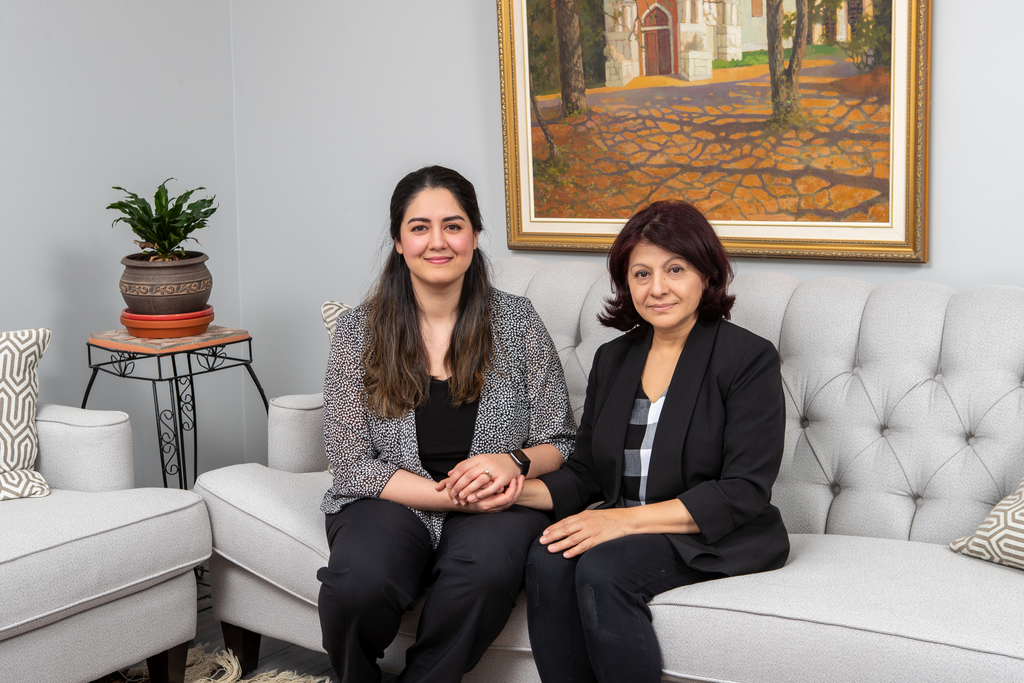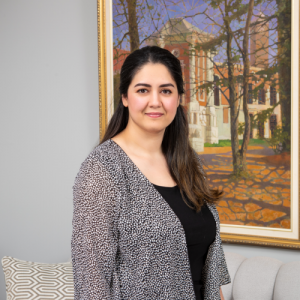Mother and daughter McMaster grads help launch program supporting Afghan refugees

Hila Taraky is a McMaster graduate and co-founder of Lifeline Afghanistan. Her mother Marufa Shinwari is a McMaster graduate and PhD student in Gender Studies and Feminist Research. (Photo by Georgia Kirkos/McMaster University)
McMaster alumna Hila Taraky and her mother Marufa Shinwari, a PhD student at McMaster, are drawing on their experiences as refugees, working with community partners across Hamilton to support those displaced and targeted by the Taliban in their home country of Afghanistan.
When Marufa Shinwari returned to her hometown of Kabul, Afghanistan for the first time in over 20 years, she saw a beautiful sight – women out on the streets and holding positions of power in society.
But within days, that striking image for Shinwari would be shattered.
“Very brutally, a girl was killed on the streets of Kabul by a fundamentalist group,” recalls the McMaster PhD student.
The woman who was killed, a 27-year-old Muslim named Farkhunda Malikzada, had been falsely accused of burning a Quran and was publicly beaten and burned alive by a mob as hundreds watched. The 2015 event angered many across the nation and prompted calls for change.

“It shocked me badly,” says Shinwari, who says the disturbing incident continued to weigh on her even after returning to Canada, which has been her home since 1998.
Shinwari fled Afghanistan in the early 1990s with her family after being targeted by the mujahideen (Islamic radical fighters). Her status as a foreign-educated woman, having studied law in Tajikistan and taught at Kabul University, made her a target.
The brutal killing of Farkhunda Malikzada would be a pivotal moment in Shinwari’s life — a life marked by an enduring tie to Afghanistan and its women.
The fall of Kabul
Shinwari’s passion for social justice and the furthering of women’s rights is something she shares with her daughter, Hila Taraky. And so, it was with great shock and horror that the two watched as Afghanistan’s capital city of Kabul was seized by the Taliban in August 2021.
“August was just marked with a lot of trauma,” says Taraky, a McMaster graduate.
“I saw my mom reliving the trauma of 20 years ago and trying to lend a hand to people who are in the exact same situation that we were in.”
The two started reaching out to their professional and personal networks in Canada and Afghanistan to try to help in the evacuation efforts.
“The focus became rescue and evacuate those who would be targeted right away,” says Taraky.
“Because when you think of the Taliban, you think of people being decapitated, women being beaten, you know, horrendous things.”
Both women drew from their backgrounds working with immigrants to Canada. Shinwari had spent years helping settle government-assisted refugees and serves as the executive director of the Immigrant Culture and Art Association (ICAA). Taraky, a business lawyer, had developed a network through her involvement with the not-for-profit service sector in Hamilton.
“So, the contacts were there and all of a sudden, everyone who’s anyone is being, you know, nudged by us and we are doing our own nudging to find a way to help these networks,” says Taraky.
Lifeline Afghanistan
The two were soon in touch with the founders of Lifeline Syria – a not-for-profit that had been launched in 2015 in response to the humanitarian refugee crisis brought about by Syria’s civil war.
Out of this connection, Lifeline Afghanistan, a non-partisan network of individuals and organizations responding to the humanitarian crisis in Afghanistan, was born.
The group fundraises and works with local settlement service agencies to match Afghan refugees with resources – whether it be housing, clothing, documentation or help navigating the medical system.
Lifeline Afghanistan and its partners also work to identify those being actively targeted by the Taliban.
“These are people who, you know, by nature of their profession, their interests and their academic qualifications and focus, they are targeted and live a life of persecution,” says Taraky. “They have no future there.”
Lifeline Afghanistan also aims to engage with Canadians willing to help in the private sponsorship of refugees. Canada has committed to settle at least 40,000 Afghan refugees by 2023.

Taraky, a co-founder of the group, and Shinwari, a supporting member, note there are two major things Lifeline Afghanistan would like to see the federal government do to help get more displaced Afghans to Canada.
One is deeming Afghans eligible for private sponsorship as refugees, rather than having them apply for refugee status through the United Nations High Commissioner for Refugees (UNHCR).
“A woman leader who held a prominent role in civil society in that previous regime is a visible target,” says Taraky. “If she with her family, or alone, somehow manages to flee and escape the border, now you’re asking her to track down a country that has a viable UNHCR office, and then stay there for years in order to be able to get her hands on that refugee status designation before being able to be sponsored to Canada.”
Lifeline Afghanistan is also calling for quotas surrounding private sponsorship for Afghans to be lifted – quotas that have been exhausted, says Taraky.
“There’s waiting lists of a few years long,” says Taraky. “And so, whether you have a fleet of donors in place, you effectively cannot use private sponsorship at this moment to help alleviate the refugee crisis that’s in your hands.”
And so, Lifeline Afghanistan is exploring other economic pathways for Afghan refugees, from student visas to remote work opportunities.
Shinwari stresses that time is of the essence. She says Lifeline Afghanistan is in contact with people being targeted by the Taliban and by those selling their belongings in the streets just to survive.
Since August 2021, Canada has welcomed 8,580 displaced Afghans into Canada.
“To achieve that 40,000 number by 2023 we need to be expansive in our views of how to get them in,” says Taraky.
Like leaves on the ocean
The refugee experience is one Shinwari and Taraky know personally.
After fleeing the country in 1992, the family lived as refugees in Russia for seven years, uncertain if they would ever be able to return home.

“As a refugee, you don’t have identity. You lose your identity. You’re nobody,” says Shinwari. “With no work, with nothing.”
“You just survive, you know? Like leaves on the ocean. And if you do survive, you reach somewhere.”
That somewhere for the family was Canada. Shinwari, her husband Yar Taraky, along with their three young children, immigrated to Hamilton, Ont. in 1998.
Shinwari and her two daughters would go on to study at McMaster. Shinwari earned her Master of Arts degree in 2016 in the Gender Studies and Feminist Research (GSFR) program, and today is working towards her PhD.
But the family maintained their ties to their home country. It was during that fateful 2015 trip back to Afghanistan that Shinwari rekindled her connection to Kabul University, where she had once lectured.
She learned there were plans in place to develop a gender and women’s studies program. Using the knowledge she had gained earning her master’s, the academic helped Kabul University faculty develop the curriculum for the program.
Once it was up and running in 2015, Shinwari returned to Kabul every year to lecture for a semester.
Watch: Marufa Shinwari on helping launch Kabul University’s Master’s Program in Gender and Women Studies
“I learned so much from my life here in Canada, that when I went back, I really wanted to contribute,” says Shinwari. “I really wanted the knowledge from McMaster and life experience from Canada I learned, I really wanted to share.”
Shinwari’s face lights up when she speaks about the program, the first of its kind in Afghanistan.
“They are treasures to me, very much,” Shinwari says of the 168 students she saw come through the program. “I have to give them credit because they put their life in danger from the day that they tried to enroll into the program.”
Hope for a better future
It is many of these treasured students, as well as the lawyers and academics Shinwari worked with, that the mother and daughter are now trying to help get to Canada.
Taraky says Lifeline Afghanistan has been met with broad support from the Canadian public and she hopes that support translates into renewed progress in helping bring displaced Afghans here.
“We’re tethered to the Afghan women. Canadian soldiers lost their lives on that soil to support the creation of a democratic state,” says Taraky. “We can’t forget our investment. We can’t forget the women who have been trained to be creative and trained to bring change into that society.”
Watch: Hila Taraky on Canada’s commitment to Afghan women
Shinwari says she does her best to inspire hope in the displaced people in her community that she keeps in contact with.
“Keep fresh whatever dream or plan you have in your life,” Shinwari says she tells them. “I’m sure that when they settle in a third country, their life journey will start again.”
And Shinwari holds hope for her own future, saying given the chance, she would return to Afghanistan to pick up the work she started on the gender and women’s studies program at Kabul University.
“If the program continues, I will be glad to, you know, maybe join again and continue doing what I did in the past, says Shinwari. “I have doubts about it [happening] in the next [few years], but still there is hope.”


